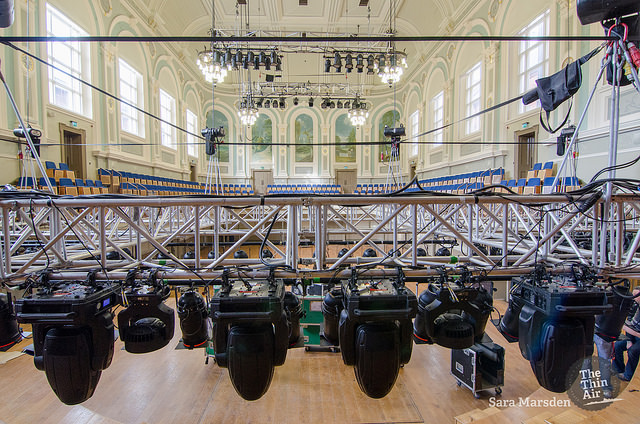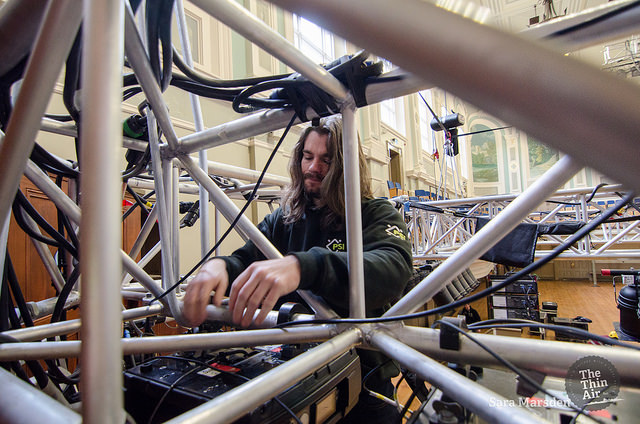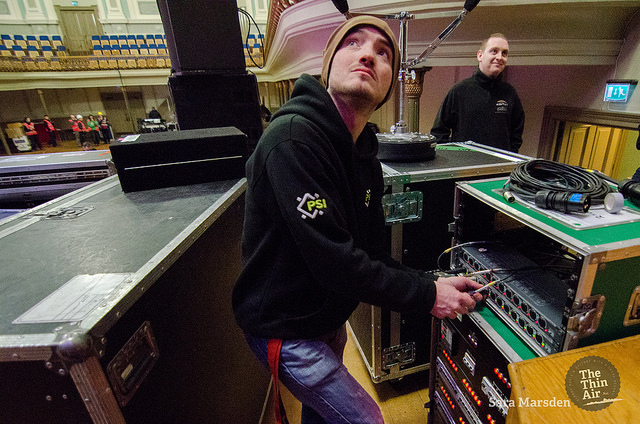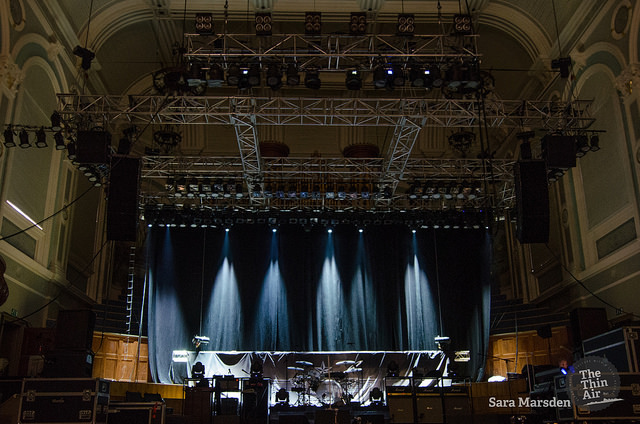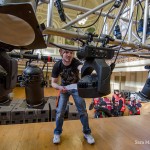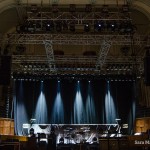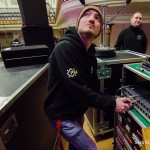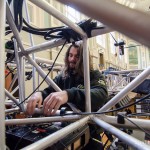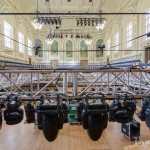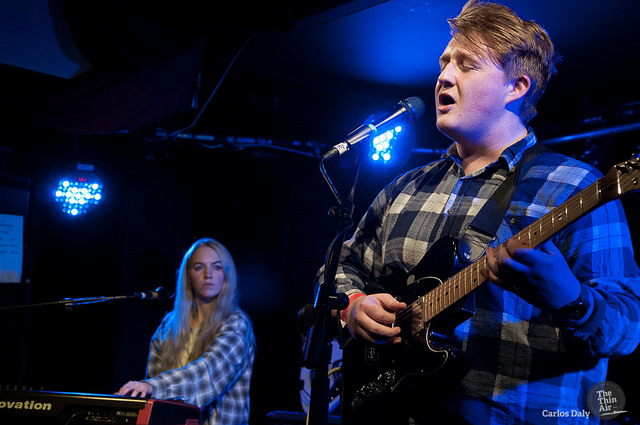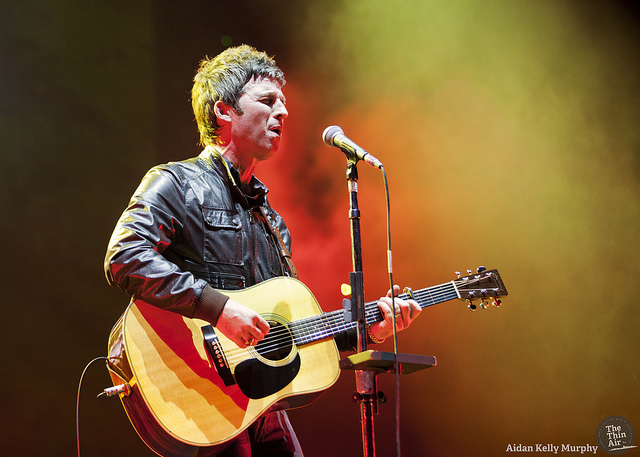In the latest installment of Front of House, our photographer Sara Marsden popped along to Belfast’s Ulster Hall to capture Sean Pagel, Joe Byrne and Davy McCready from Ireland’s premier lighting company, PSI. Offering a wonderful insight into the industry, Pagel touches on the technical and creative sides of lighting, providing the lighting for the likes of Riverdance, Philip Glass and Live at the Marquee, as well as some personal insight into the peaks and (seemingly very rare) low points of the job.
Hi Sean. First off, can you tell us how you first got into the lighting business?
When I left school I knew I wanted to work in this industry, and despite my school careers teacher telling me I needed to concentrate on a ‘proper career’, I started looking for ways into the business. I joined a course in college, BTec Nat Dip in Performing Arts, and through work experience started working in a local recording studio. From there I got into live sound… but everyone wanted to be a sound engineer! I saw a gap in the market at the time for lighting techs, so followed that path.
From both a personal and technical point of view, how have things changed in the industry since you first started out?
In some respects, hugely, in others, not at all. I got into the industry because I had a passion and drive to be involved, and to be the best at what I do, and that still remains! Technically, things have changed quite a bit. Health and safety nowadays means that many of the practices which were commonplace when I started are now illegal! Also, with the advances in LED technology, the fixtures we work with now are smaller, lighter, and use much less power, so the supplies don’t need to be as big. When I started, it was not the easiest career path to follow; the industry was not exactly respected as a serious choice of employment, with many people thinking it was just a bit of a laugh. Now there are more opportunities to pursue careers in the arts/entertainment sector. At PSI we have the only dedicated training department in the country, and from August we will be offering approved industry apprenticeships in Technical Theatre Support, Lighting, and we have been tirelessly attending school careers events across the country, spreading the word and raising awareness amongst potential school leavers.
You call yourselves “Ireland’s premier lighting company”. How in demand are your services and where does the company take you on the road?
We call ourselves that because we are! We are busy here pretty much all year round. Our heaviest periods are from May to December, but even at that, our training courses and other specialist jobs keep us busy at the ‘quiet’ times. Also, large scale events such as the Carl Frampton Title Fight in the Odyssey last week, where we supplied and managed all technical aspects of the live elements of the event; lighting, rigging, sound and LED screens are common to us. We recently got the contract to supply the current tour of Riverdance which is in China and Japan at present for 6 months, as well as their new show, Heartbeat of Home, which we covered for its premier tour last year. That started in Bord Gais Energy Theatre in Dublin, before heading to China as well.
You’re doing lights for Europe here at the Ulster Hall. Using this show as an example, could you take us through the schedule from pulling up to the venue to leaving for home afterwards?
This is actually one of the easier jobs for us here. The venue has a rig already in place, so we just have to supplement it with some moving lights. However, no matter what size the job, the procedure is the same.
Today we arrived at 0800. First thing is to find the local crew, and get the truck unloaded. While one of us oversees that, someone else finds the venue staff to make arrangements for where lights are going to be placed, and in the case of this venue, to get the stage extension dropped to be able to get all the equipment lifted onto the stage. On most jobs we would mark out the floor to identify where we need to rig motors to lift trusses, etc, and then send the riggers to the roof to pull the motor chains to the roof, but here it’s easy, as they have a mother grid- that takes the pressure off a bit! Once the lamps are hung on the trusses and cabled and checked the rig is lifted out to trim height for the show. On this show, production from the tour aren’t due until 1030, so we have time to breath! When the lighting designer comes in we’ll talk with them, give them all the details on the rig that we have installed, run through plans and patching details, and once he’s happy, and the kit is set up onstage, we’ll do a focus on the rig, so that everything is pointing in the right places. It’s probably around 1 or 2 pm by the time we get to this stage. Once the LD is happy, we are free to start to get things in order for the load out, so that we are prepared as soon as the show ends. 11pm usually sees a mad rush by everyone to try to get out as fast as possible! It’s everything we did earlier, but in reverse. It all goes out much quicker than it came in. We’ll be done from here around 0030… then on to tomorrow’s shows…
From a personal point of view, what has been the most rewarding job/concert you’ve done over the years?
It’s hard to pinpoint one event in particular – I enjoy every one! Years ago, as part of Belfast Festival, I worked on the live presentation of ‘Monsters of Grace’, a film with a soundtrack by Philip Glass, which was performed by orchestra, conducted by Glass, and simultaneously screened in 3D. We had to bring in specialist projection equipment, and the print of the film, which was on 70mm, 20 minute reels in two parts – left and right, was the only copy in the world! The two projectors had to start perfectly in sync with one another, manually, and the conductor was taking cues from us for his start. Once we hit ‘go’ there was no going back! It was probably one of the most intense events, pressure-wise, but also very rewarding when it all went to plan, three times in a row.
How large is the team and how do you ensure everything goes smoothly from show to show?
We have a relatively small team behind the scenes, keeping things in the business running. We’ve got a couple of admin staff who look after invoicing, etc, to make sure the money is there to pay the bills, we have a head of training who looks after the coordination of any training events, and also works with schools to raise awareness of what we do, we have a small team of project managers who take the inquiries, and put hire lists together, liaising with the clients from the initial call, through to after the event. Our warehouse staff are responsible for checking all equipment as it comes in and goes out. They get lists from the project managers and they have to prep it all to the highest standard so that the techs on site don’t have to worry about whether kit will work or not. All our technicians on site are skilled and trained in the use of the gear we provide. They are the guys on the front line, dealing with the designers, so they have to know what they are talking about! Before an event, the chief tech goes through the job with the project manager in detail, and after the event they have a debrief so that, if there were any issues, they can be avoided in future. No one element ensures the smooth running of an event; all these factors need to work together to make a job flow. Lighting is, of course, a hugely important part of any gig – especially big shows in venues such as the Ulster Hall.
How much preparation goes in to shows of this scale in terms of programming lights, organisation etc.?
On a job like this, the tour has their own Lighting Designer, so we are responsible for providing them with what they ask for. The designer will have spent a lot of time going through the music, designing the lighting to suit the mood, and they will have selected different fixtures for different tasks and effects. It’s then up to us to be able to give them the fixtures they ask for. Every designer has a favourite manufacturer, and inevitably there will be times that they ask for equipment we don’t own, so we will need to offer substitutions, or source the actual fixtures they want. On top of this, I deal with staffing every event, matching the right technician with the right skills, to the relevant jobs, as well as the logistics aspects; what time does everything need to be there, how is it getting there-what size of vehicle is required, do we need parking permission, are there restrictions of access, etc. It’s not just a case of rocking up and throwing some lights into a room!
Are there any interesting or funny experiences on the job that you’d like to share?
Every job is different, that’s why I love it. You get to see different places, meet different people and try new things every week! One funny experience I had was many years ago, still during the Troubles when there were still permanent army checkpoints around the country. I was working on an event in South Armagh, and had gotten completely lost driving the truck, which was filled with rigging equipment and fireworks. I pulled up at a checkpoint and was questioned by an eighteen year old soldier carrying a gun bigger than himself as to who I was, where I was going, etc. When I told him I was heading for Crossmaglen he thought he needed to look into it more. “What’s in the truck?” he asked. I pointed to the transport of explosive material card in the front window of the truck and answered ‘Explosives.’ He was suddenly exceptionally helpful with directions, and couldn’t get me away quick enough!
To anyone who might have an interest in getting involved in the industry, how would you advise them about forging connections and starting out?
You’ve got to have drive, determination and a real passion for the industry, be flexible, and ready to work very antisocial hours! There are easier ways to earn a living, but generally, I don’t think I know anyone whose purpose for being in this position is money. Get in touch with a company, such as us, and start to volunteer. Get to know the equipment and people, and learn as you go. If you do, you’ll soon become useful, and companies will start to want you on their jobs. PSI are running apprenticeships in lighting from August this year. Anyone interested in applying for these should contact rainer@
Finally, what are the plans for the rest of the year – festivals, touring concerts etc.?
Riverdance, which has been in China since September, is on its way to Japan at present, and that will get back to us in May, before heading to the Gaiety in Dublin for a ten week run. We will also be looking after the lighting again this year for the Live At The Marquee festival in Cork, which runs for 5/6 weeks over June and July.


